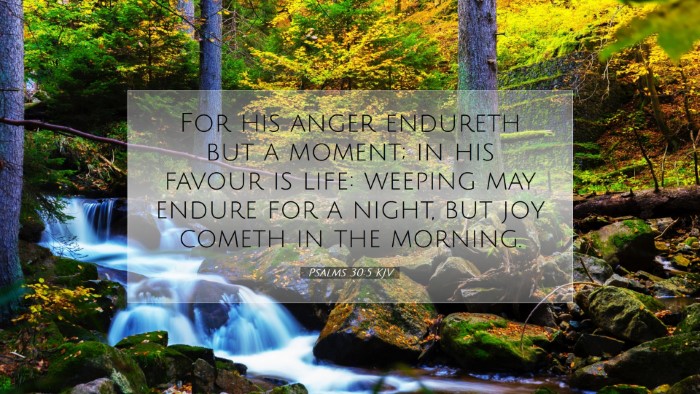Psalms 30:5 Commentary
Verse Analysis: "For his anger endureth but a moment; in his favour is life: weeping may endure for a night, but joy cometh in the morning."
This verse encapsulates profound theological truths about God's character and the human experience of suffering and redemption. It underscores the tension between divine displeasure and benevolence, temporary trials, and the lasting joy provided by God.
Insight from Public Domain Commentaries
Matthew Henry's Commentary
Matthew Henry highlights the contrast between God's wrath and His mercy. He notes that God's anger is not perpetual but fleeting, a momentary response to sin that leads to genuine repentance.
-
A Moment of Anger:
Henry explains that God's anger, when provoked, is intended for correction rather than destruction. It serves a purpose—to lead sinners back to righteousness.
-
Joy After Mourning:
He emphasizes that the promise of joy is always around the corner, especially as believers trust in God's providence. The night of weeping gives way to the dawn of God's joy, depicting the cyclical nature of life influenced by divine intervention.
Albert Barnes' Commentary
Albert Barnes offers a deeply pastoral perspective on the verse. He encourages believers to understand that while trials may come, these are not signs of God's abandonment but invitations to deeper faith.
-
Chastening and Restoration:
Barnes suggests that the brevity of God's anger is a testament to His favor and love. He points out that even during moments of discipline, God is still at work, leading His people back to joy.
-
Weeping and Morning Joy:
He interprets the metaphor of weeping as emblematic of life's struggles. However, he assures that the 'morning' symbolizes not only the end of suffering but also the renewed hope and strength that a relationship with God offers.
Adam Clarke's Commentary
Adam Clarke combines linguistic analysis with spiritual insight, focusing on the Hebrew terms used in the text. He underscores the poetic structure of the verse, inviting readers to appreciate its beauty.
-
Temporal vs. Eternal:
Clarke elaborates on the idea that the troubles of life are temporary while God's mercy is eternal. He affirms that weeping serves as a catalyst for spiritual growth, a necessary prelude to experiencing joy.
-
The Role of Faith:
Clarke stresses that the believer’s faith is crucial. The assurance that 'joy cometh in the morning' is predicated on trust in God's character and promises. He encourages believers to cling to faith even in the darkest times.
Theological Reflections
This verse presents a rich tapestry of ideas that resonate with various theological themes. Here are some reflections integral to understanding Psalms 30:5:
-
The Nature of God:
This psalm articulates God's dual nature of justice (anger) and grace (favor), aligning with the broader biblical narrative that emphasizes God as both a righteous judge and a loving father.
-
The Human Condition:
It reflects the reality of human suffering and divine response. All believers face trials, but this psalm reassures them of God's presence and eventual restoration.
-
Encouragement for Believers:
The assurance that joy follows sorrow serves as a powerful reminder of hope. It encourages believers to endure hardships, knowing they are temporary in the light of God’s eternal favor.
Application for Ministry and Personal Reflection
For pastors, students, and theologians, this verse embodies core principles that can guide ministry practice and personal faith:
-
Encouragement in Trials:
Biblical teaching should emphasize that trials are a part of the Christian journey. Ministers can provide pastoral care by reminding congregants of God's faithfulness amid suffering.
-
Celebration of Restoration:
The promise of joy can energize worship and fellowship activities, encouraging communities to celebrate both spiritual and personal victories after seasons of struggle.
-
Counseling with Hope:
During counseling sessions, referencing Psalms 30:5 can offer hope to those grappling with distress, framing their experiences in light of God's temporary correction and ultimate restoration.
Conclusion
Psalms 30:5 encapsulates a fundamental truth of the Christian faith: that God’s anger is momentary, but His favor is eternal. Weeping may endure for a night, but the promise of joy brings hope and assurance to believers.
This verse invites reflection on the dual aspects of God's nature and encourages believers to embrace both their struggles and their eventual restoration in Christ. In times of despair, it is vital to remember that God’s joy is just a dawn away.


